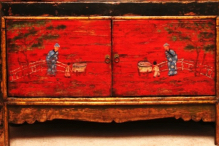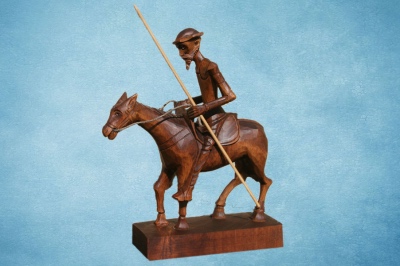A Valuable Time Spent Listening
|
It is interesting how objects around my home talk to me, and, most of the time, it is late at night. It was just an evening ago that one of what I call my treasures, a wooden statue of a Sherpa from Tibet, spoke to me from my bookshelf.
I went over to the bookshelf and inquired about why another one of my treasures decided to chat. I told the Sherpa that I have gotten quite used to my so-called inanimate objects talking with me. Actually, I expressed my appreciation to the Sherpa since I gain a great deal of information when I converse with them. Interestingly, there have been over a couple dozen objects in the past year that have taken the opportunity to discuss things with me. I asked my Sherpa statue what his name was.
The statue replied, "My name is Tenzing. Most Sherpas never had more than their first names until relatively recently. I know that you know what Tenzing means. You have taught Tibetan Buddhism for decades and actually picked me up in Tibet on your second visit to my country." I replied to the Sherpa that the name Tenzing, means one that possesses Buddha's Dharma or teaching/doctrine. I took Tenzing to my desk for a chat, which lasted into the early hours of the next day. I began our talk by wanting to know why Tenzing wanted to talk with me.
"You seem to be a very busy person," said Tenzing. "At your age, why are you still pushing yourself? Is it necessary?" Initially, that question seemed strange, since Tenzing knew about my dances with death. However, I followed his lead. I told him that those that successfully have lead death as they danced are determined and driven after the dance. "I understand what you call doing the dance, but a part of you seems to want to know in advance what will happen. You seem hesitant when all your ducks aren't lined up in order." I merely responded that I don't want to look like a fool to others due to not acting. Tenzing interrupted, "You talk about being a 21st century Don Quixote regardless how people might see him as a knight-errant. Why can't you just accept that some might think that some of your joisting with windmills is a waste of time?" I expressed that I have no problem fighting the good fight, but I don't like nay-sayers who diss my efforts. "You want people to understand Don Quixote's courage and determination, which you wish to emulate. However, do you think that the man of La Mancha joisted with all those windmills without fear? People laughed at his efforts, and he failed with many of the windmills. How are you any different than your role model?" I tried to gather my thoughts before blurting out something that didn't make sense. I saw where my Sherpa was going. Nonetheless, I just sat there attempting to gather my thoughts together to express a coherent statement. Knowing that I wasn't coming up with anything quickly, Tenzing began again. He started to explain the history of Sherpas. I knew full well that he understood his thinking process and just listened. "Sherpas came from Tibet and migrated to Nepal. Actually, the name comes from shar, which means east and pa, which means people. In other words, Sherpas are the eastern people. They left Tibet and went exploring the Himalayan Mountain range. You know what the Himalayas are like; you've been there and flown over the mountains." I told Tenzing that the first time that I went to Tibet, I had a driver take me from Kathmandu, Nepal through the Himalayas to Tibet. The altitude is vast, but you adapt to it as you drive East. However, the second trip to Tibet, I flew into Lhasa, which resulted in altitude sickness after arriving. It was then that Tenzing finally drove home his point. "Sherpas are great mountain climbers. When people from Europe or the States want to climb Mt. Everest, which stands about 30,000 feet above sea level, they hire Sherpas as guides, because, over the centuries, their bodies have adapted to the heights. Their blood or hemoglobin contain large amounts of nitric oxide, which allows them to push themselves while climbing. You got attitude sickness when you flew into Lhasa, which is less than 12,000 feet. Mt. Everest is 2.5 times higher than Lhasa. So you can imagine how the Sherpas' bodies had to adapt to the great height of Mt. Everest. "However, even with the way their bodies acclimated to the thin atmosphere over centuries, it is still difficult to climb Mt. Everest. Additionally, there were many dangers related to climbing beyond the issue of the difficulty of breathing. Sherpas had to watch every step as they climbed. They knew that any misstep might be their last. The fear of dying was ever-present during their climbs." I acknowledged the fear factor. Having done two dances, I told Tenzing that I'm grateful that I am alive and well, but there is always the fear factor. Sooner or later, I won't be able to dance with death successfully. I tried to get that feeling across to my wooden Sherpa. Tenzing acknowledged that I understood dancing with death far better than most people. "You are kind of like on the horns of a dilemma. You are happy with dancing well with death while you know that ultimately, you won't be successful. Well, who knows how long anybody has to live. However, everyone ought to carry on in their journey. The Dalai Lama is 80 now, but he is planning a conference when he is 90. That is the way all people ought to live their lives."
I told Tenzing that I want to outlive George Burns. Both Burns and I share January 20 as our birthdays. I even want to have a one man show at the Palladium in London on my 100th birthday. Tenzing's retort was to remind me what Confucius said, "'A journey of a thousand miles begins with a single step.' Hence, do as all Sherpas have done...start your journey. At your place in life having journeyed far, what all lies before you?" I went into a long litany of personal and professional matters. Some of them are unrealized dreams like windmills that I have failed in my joisting. I told my wooden Sherpa that some of my dreams are interviewing President Obama, Aung San Suu Kyi, and Clarence Page. The Sherpa suggested, "Allen, I would pick one of the three now and try again. What other goals do you have? The term that you use for goals is windmills due to your mentor, Don Quixote. Get up tomorrow morning and work at realizing some of your goals, but don't forget what the Dalai Lama said, "Remember that sometimes not getting what you want is a wonderful stroke of luck."
Visit the On Seeing the Light page to read more about this topic.
Visit the Connecting the Dots page to read more about this topic.
Visit the Talking with Objects page to read more about this topic.
Visit the "Don Quixote" page to read more about this topic.
Visit The Mentors and Me page to read more about this topic.
Visit the Confucius Said page to read more about this topic. 06/17/16 Follow @mountain_and_me |
















